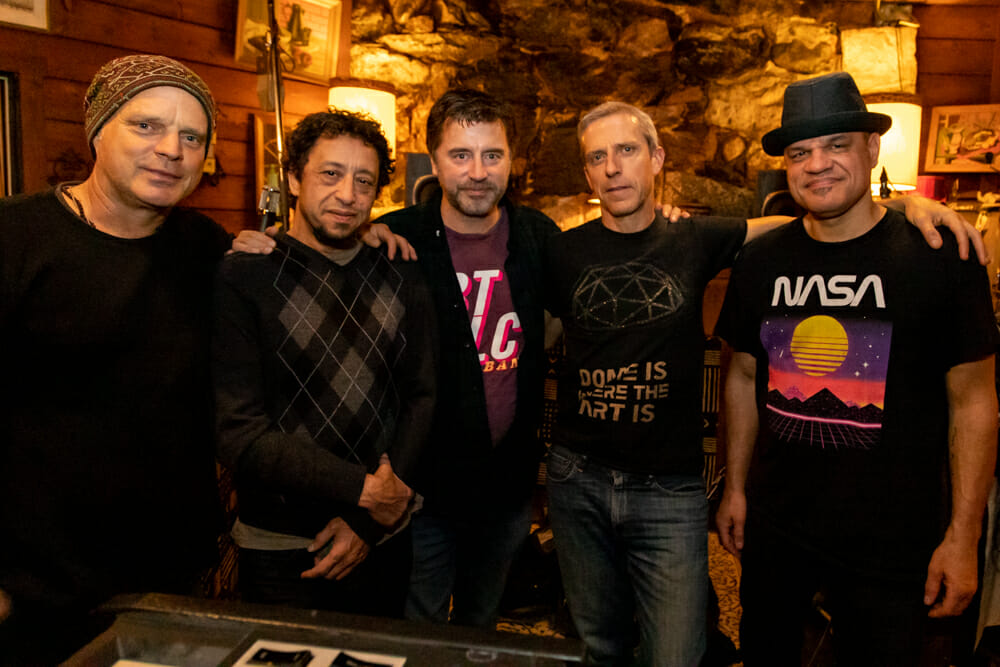Spotlight: Club d’Elf

photo credit: Joan Hathaway
In 2015, bassist Mike Rivard once again traveled to Peru’s Amazon region to participate in the sacred-plant ceremonies associated with the Shipibo people’s shamanic tradition. As founder of the Boston-based trance-improv collective Club d’Elf—whose name alludes to inner-space entities described by ethnobotanical seer Terence McKenna—Rivard already had a certain familiarity with the spiritual realm. But this time was different, and not in a good way. Several weeks later, after returning to the States, he was diagnosed with a pulmonary embolism. Clinical depression, accompanied by panic attacks and insomnia, would follow.
“I was born on Halloween,” Rivard says over the phone from his home in Waltham, Mass. “I’m a Scorpio, and I’ve always been attracted to the darker side of things. But this was about as deep an immersion in that modality as I could ever expect.”
To regain his musical footing, Rivard dove deeply into yet another healing spiritual tradition. Twenty years earlier, he had picked up the sintir—a four-stringed, bass-like lute covered in camel skin that is associated with the gnawa music of Morocco. He began transcribing gnawa legends such as Mahmoud Guinia and Mustapha Baqbou and, eventually, returned to the studio with Club d’Elf and a new batch of material. It included Moroccan songs associated with the chaabi folk tradition, jazzy originals and iconic covers—including Frank Zappa’s “King Kong” and Miles Davis and Joe Zawinul’s “In a Silent Way/ It’s About That Time”—that would be performed in large part over the famously beguiling chaabi rhythm.
“Frankly, for me, it was a Hail Mary pass,” Rivard says of the sessions that would become You Never Know, Club d’Elf’s third studio album.
And, apparently, the musical remedy worked. (Working on a goat farm helped, too.)
Rivard concocted Club d’Elf in 1998 at the urging of the late Mark Sandman, in whose pre-Morphine band Hypersonic he played. Club d’Elf convened biweekly at Boston’s Lizard Lounge and eventually coalesced into a core quartet—consisting of Rivard, Dean Johnston (drums), DJ Mister Rourke (turntables) and Brahim Fribgane (oud, vocals and percussion)—that frequently hosted guests.
Keyboardist John Medeski, who sat in at d’Elf’s third show and has joined them at many more gigs since then, has played a prominent role on all of the combo’s studio albums. “I’ve known Mike for 30 years,” Medeski says. “We’re like brothers. We’ve been in the jungles of Peru together. And we were both vegetarians on the road in the Midwest during the mid ‘80s,” as members of saxophonist Russ Gershon’s “small big band,” the Either/ Orchestra. Elf’s “dance-y, trance-y, Moroccan-inflected funk,” Medeski explains, fulfills his own dedication to “making music in the moment for the moment” by providing solid structures that can be created or deconstructed each evening depending on who’s playing. “And I get to be an accompanist, which I love to do but doesn’t happen so much with Medeski Martin & Wood since it’s a trio.
The 2019 sessions for You Never Know—named after Rivard and Medeski’s longtime motto—took place in February and December. Two different versions of the band played live, with horns and DJ Mister Rourke’s “secret sauce”— including McKenna samples—added afterward. The earlier session was augmented by keyboardist Paul Schultheis, guitarist Duke Levine and lap-steel guitarist Dave Berry; Medeski and guitarist David Fiuczynski sat in later. A vintage Studer two-inch tape machine captured the magic with cozy analog fidelity. “When you have musicians like this,” Rivard says, “turn ‘em loose and just make sure the tape is rolling because the music just pours out.”
You Never Knows opens with “Boney Oscar Stomp,” a swampy gutbucket groove evoking the spirit of Richard Zukowski, the Massachusetts body worker and poet to whom the album is dedicated. Debilitating tendonitis being a frequent hazard of the music trade, Rivard says Zukowski— who occasionally performed as Boney Oscar—“made it so a lot of us could continue playing.”
In person, as their many excellent live albums demonstrate, a Club d’Elf show unspools over extended grooves in a manner not unlike a night-long gnawa ceremony. Rivard’s approach to groove has evolved over the years. “Sandman was my drill sergeant in the school of groove,” Rivard says. “Coming out of Berklee [College of Music], I had a lot to prove. I thought I was Bootsy Collins, but Mark would keep turning around and saying, ‘No fills!’ If you’re into trance music, that’s something you have to overcome.”
Rivard calls the 6/8 chaabi groove, with its devilish wobbly subdivisions, “the Bo Diddley beat of Morocco.” The album brings the Morocco connection home with a cover of political folk stars Nass El Ghiwane’s “Allah Ya Moulana” (Allah Is With Us), the chaabi-Indian mashup “Aisha Kandisha” and the secular gnawa tune “Zeed Al Maal,” which means, roughly, “help a brother out.” For Rivard, “the beauty of Morocco is that there’s so much music—everything from gnawa to the Berber music in the Atlas Mountains to Andalusian classical music.”
The Zappa and Davis covers, particularly excellent gateways to the chaabi sound, join earlier d’Elf tributes to Cream (“Sunshine of Your Love”) and Morphine (“Level Up Your Soul”). But the album’s emotional center is likely located in the originals “Now Open Your Eyes” and “Golden Hour,” lovely and languid reflections of whatever Rivard discovered at the other end of his spiritual crisis. “I tend to learn the most from the most difficult experiences,” he says, “and I wish it were different. I wish I had the ecstatic experiences others seem to get but, for me, it tends to be a rougher road.”




















